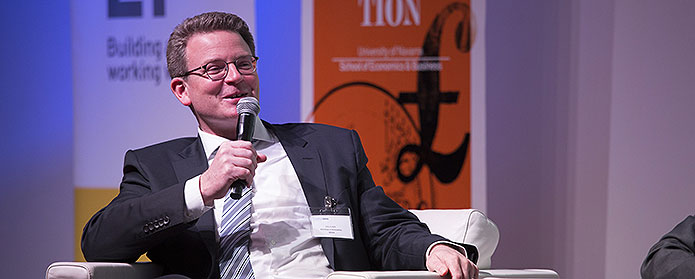FROB, BBVA and Bank of Spain Experts Tackle Financial System Resolution
The Resolvability Workshop brought together a range of experts to discuss the new challenges facing the resolution process

The Resolvability Workshop organized by the Master’s Degree in Banking and Financial Regulation in collaboration with Ernst and Young (EY) brought together experts from the Bank of Spain, BBVA, EY, Nomura, Banco Santander, the Single Resolution Board and the University of Navarra. In front of more than 100 attendees, the experts discussed the new challenges facing the resolution process.
Jaime Ponce, the President of the Fund for Orderly Bank Restructuring (FROB), looked at the Fund’s role within the new framework for resolution and explained the new functions of the national authority for executive resolution, as well as detailing how these would be compatible with the termination of earlier processes.
Ponce mentioned the consequences, lessons and reforms carried out in the banking industry as a result of the financial crisis, such as the injection of public funds by the European Union, capital requirement stipulations and the strengthening of corporate governance. He then went on to highlight the role played by the FROB in the process of restructuring the banking industry and explained that the Fund had given more than €58 billion in aid to Spain’s financial institutions since its creation in 2009.
The first panel discussion, which looked at the impact of digitalization on banking resolution, included contributions from Javier Lipúzcoa, the Director of Architecture and IT Innovation Strategy at BBVA; Arturo Derteano, a Partner on the Digital Transformation Team at EY; and Silvia Senabre, an auditor from the Bank of Spain’s Group for Technological Innovation. Senabre talked about the three new challenges of digitalization: one, the fact that “within this process regulators and supervisors need to adapt in order to keep abreast of the digital transformation in banking, which in turn requires the evolution of their own role”; two, that while the majority of risks related to digital transformation are being analysed, the resolution process brings new perspectives on risk; and three, that new, as-yet unknown risks will emerge during the digitalization process of the banking industry.
“The Challenges of Resolution Planning” was the title of the second panel discussion, which had contributions from Alberto Casillas, the Managing Director of the Resolution Department at the Bank of Spain; Carlos López Galán, the Global Head of Capital Management at Banco Santander; and Mario Delgado, a Partner on the Financial Regulation Team at EY. López Galán talked about Banco Santander’s Corporate Resolution Plan and examined the barriers to and implementation of TLAC requirements at the bank.
The final session, “The Journey to MREL”, was a discussion of the minimum requirement for own funds and eligible liabilities that are permitted under the new regulations. Contributions were made by Axel Kunde, the Head of the Single Resolution Board’s Resolution Planning and Decisions Unit; Andrés Calzado, the Managing Director for Debt Capital Markets at Nomura; and Tom Huertas, the Lead Partner in the Global Regulatory Network at EY.
